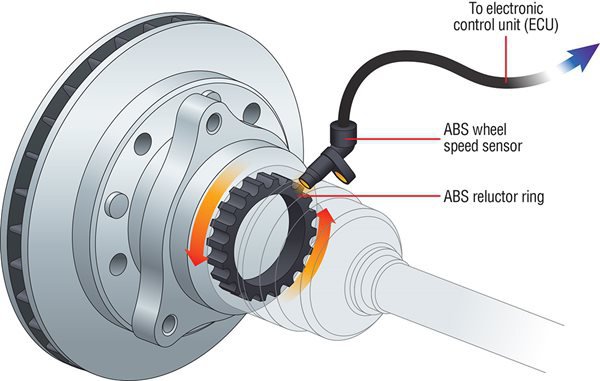When you’re driving your car, a smooth experience is essential for comfort and safety. However, various issues can cause problems, one of which is the ABS (Anti-lock Braking System) sensor. Many car owners wonder if a bad ABS sensor can lead to vibrations. This article explores the connection between an ABS sensor malfunction and vehicle vibrations, digging into the mechanics of how these systems work and what symptoms to look out for when things go awry.
Understanding ABS and Its Function
The Anti-lock Braking System (ABS) is a vital component that helps prevent wheel lock-up during braking. Each wheel has its own ABS sensor that monitors its speed. The system ensures that brakes are applied in a controlled manner, helping to improve vehicle control and stopping distance, especially on slippery surfaces.
When the ABS sensor detects that a wheel is slowing down significantly compared to the others, it modulates the brakes on that wheel to prevent skidding. This is especially crucial for maintaining stability in emergency braking scenarios. If an ABS sensor fails or provides inaccurate readings, it can disrupt this balanced response, leading to various issues, including vibrations in the car.
Symptoms of a Bad ABS Sensor
Several noticeable signs can indicate that your ABS sensor is malfunctioning. The most immediate symptom is the illumination of the ABS warning light on your dashboard. This light serves as an alert that something is wrong with the ABS system.
In addition to the warning light, you may experience unusual behaviors during braking. One of the most common experiences is pulsating brakes. Instead of a smooth stop, you may feel a distinct vibration or shudder through the brake pedal. This could also be accompanied by a metallic grinding noise, which further suggests that the ABS isn’t functioning optimally.
Link Between ABS Sensor Issues and Vehicle Vibration
You may wonder how a faulty ABS sensor could lead directly to vibrations while driving. It all ties back to how the ABS system interacts with the vehicle’s other systems. When the ABS sensor fails, it can send incorrect speed data to the control unit. This misinformation can confuse the braking system, leading to uneven braking.
When this happens, you might feel vibrations while braking. The car might shake, making the driving experience uncomfortable and potentially dangerous. Moreover, a malfunctioning ABS could mean the car doesn’t brake smoothly, which could enhance vibrations and create a chaotic driving experience. This disruption in the braking system can cause vibrations in various ways, particularly at higher speeds where stability becomes crucial.
Other Causes of Vibration While Driving
While an ABS sensor issue can lead to vibrations, it’s essential to recognize that several other factors can contribute to this problem. These might include an imbalance in the tires, misaligned wheels, worn brake components, or even engine issues.
If your tires are unevenly worn or not balanced correctly, they can lead to vibrations felt in the steering wheel or even throughout the vehicle. Similarly, a geometry issue, such as misalignment, can cause the vehicle to pull to one side, resulting in vibrations and instability.
Worn-out brake pads or rotors can also be a significant factor. If they’re not functioning correctly, they may result in uneven braking forces, which can contribute to vibrations. An inspection of all these components is crucial when diagnosing the cause of vibrations.
Diagnosing ABS Sensor Issues
When diagnosing ABS sensor problems, a thorough inspection is needed. Start by checking for any trouble codes using an OBD-II scanner. This device can read various data points and help identify whether there is an ABS-related issue.
Visual inspection is also crucial. Look for damaged wiring, loose connectors, or debris around the sensor. Sometimes, dirt or grime buildup can affect sensor performance. Make sure to clean the sensor properly if dirt accumulation is evident.
Additionally, ensure the wheel speed sensors are correctly mounted. Loose or improperly secured sensors may give false readings, which can trigger inconsistent braking responses and vibrations.
Solutions for Fixing Bad ABS Sensors
Once you’ve identified a bad ABS sensor, the next step is to address the issue. In many cases, replacing the faulty ABS sensor is the most straightforward solution. However, if there are wiring issues or connector problems, those must also be rectified.
Acquiring a quality replacement sensor is essential as subpar products may not perform reliably, leading to repeated issues. Once replaced, it’s vital to calibrate the ABS system correctly to ensure all components work in harmony.
After the repair, it’s good practice to take the car for a test drive to confirm that the vibrations have ceased and that the ABS system functions correctly. The absence of warning lights on the dashboard post-repair must also be verified to ensure everything is working as intended.
Preventive Measures for ABS Sensor Issues
Preventive maintenance can help avoid ABS sensor issues in the first place. Regular inspections of your braking system, including the ABS, can catch problems before they escalate. This could include checking the sensors, cleaning them occasionally, and ensuring that all connections are secure.
Moreover, maintaining your tires and keeping them appropriately inflated can help ensure that you do not inadvertently strain the ABS system. Regularly rotating your tires and having them balanced will also contribute to smoother handling and braking performance.
Additionally, being mindful of your driving habits can go a long way in preventing wear and tear on the braking system. Avoiding aggressive driving, harsh braking, and excessive speed will reduce the strain on your ABS and its related components.
Conclusion
In summary, a bad ABS sensor can indeed cause vibrations in your car. It is essential to pay attention to warning signs such as the ABS light illuminating, unusual brake response, and any vibrations while driving. Diagnosing the problem is crucial and may involve checking for error codes and visually inspecting the sensor and its wiring.
Although vibrations can arise from various other issues, addressing ABS sensor problems can be significant for your vehicle’s overall performance. Conducting regular maintenance and inspections can prevent such issues, leading to a safer and more comfortable driving experience.
FAQs
1. How can I tell if my ABS sensor is faulty?
The most common signs include the ABS warning light turning on, unusual brake response, or vibrations felt while driving.
2. Can I drive my car with a bad ABS sensor?
While your vehicle may still be operable, it is generally unsafe to drive with a malfunctioning ABS sensor as it affects braking performance.
3. How much does it cost to replace an ABS sensor?
The cost varies, but generally, ABS sensor replacement can range from $100 to $300, including parts and labor.
4. Is it possible for a bad ABS sensor to affect my entire braking system?
Yes, a malfunctioning ABS sensor can disrupt the braking system, leading to poor brake performance and potential safety issues.
5. How often should I have my ABS system checked?
Regular checks are recommended during routine vehicle inspections or if you notice any symptoms suggesting problems, ideally every 10,000 miles or annually.



